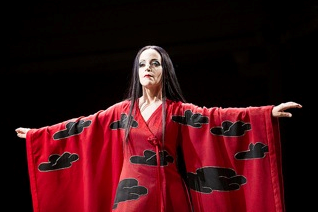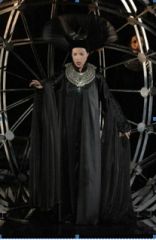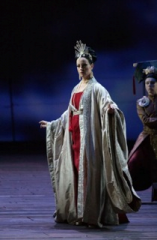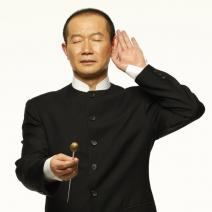Meet Lise Lindstrom – “A Great Turandot”

“The tall, slender Lindstrom wielded the icy glamour of a 30’s film star, working the trains and veils of her elaborate costumes with the panache of a runway model.” Turandot, New York Post
Sydney audiences are in for a very special experience when Opera Australia presents Graeme Murphy’s production of Puccini’s Turandot in the forthcoming 2015 winter season. The title role will be sung by American dramatic soprano Lise Lindstrom.
In the 2013-2014 northern season, Lise Lindstrom made a significant impact with her debut in the Puccini role at the Royal Opera, Covent Garden, a performance that was beamed to movies houses around the world and captured in High Definition on DVD. During that season she marked her 100th performance of the role, just ten years after her first performance in Mobile, Alabama. Opera News raved that “Lindstrom understands that a great Turandot needs to find the moments when the character’s vulnerability can be revealed. The soprano accomplishes just that, delivering in Act 3, soft yet insistent legato phrases, though Puccini gives few opportunities to do so. We saw the tender heart beneath the glacial, dragon assoluta exterior.”
“Working at Covent Garden was truly a pleasure” says Lindstrom. “It’s an enormous company with an enormous schedule, and yet it somehow feels like family. I expect the same to be true at Opera Australia. I have heard from many of my colleagues how wonderful it is to work with OA. As far as sightseeing goes, the only thing on my very short list of things to see is the opera house. Maybe someone can help me extend my list?”
The soprano herself reiterates what an important role Turandot has been in her career development and how delighted she is to be coming to Sydney to make her Opera Australia debut. “The truth is that Turandot really taught me how to sing,” she says. “I somehow found myself and my voice in Turandot. For years I was singing lighter, more lyric repertoire and it was really difficult for me. I had no success getting work or getting an agent. I just never ‘found’ my voice in the lighter repertoire. It seemed like I might never get a ‘break’ in the land of opera.”
Having recently sung the role at the world’s best opera theatres including Milan’s Teatro alla Scala and New York’s Metropolitan Opera, arguably Lindstrom is now regarded as one of the most respected dramatic sopranos of her generation.

On the subject of dramatic voices she says, “I think the only prerequisites to singing the dramatic repertoire are that one is able to do so without harm to themselves, their instruments, and the absolute ability to make the sound required to musically portray the character. To me that naturally means younger voices will more than likely have difficulty producing the required sound, in addition to grasping the deep theatrical skill required to portray these characters. Nonetheless, everyone has their unique path and speed of development. I wouldn’t feel comfortable saying that someone has to wait until such and such an age before singing this repertoire.”
She adds, “Many singers are drawn to big sounds and dramatic music, and they end up throwing themselves under the bus by biting off more than they can chew. The truth is, no matter what size of instrument one has, if the sound isn’t pleasing to the ear, efficient and compelling it doesn’t matter how much sound you can make. So I would say: Learn to sing. Period. And move on from there. If one isn’t interested in finding the most efficient and pleasing way to sing, then perhaps there is some confusion about the end goal.”
Lindstrom’s recent debut in the demanding role of Elektra in Hamburg, under the direction of Australian conductor Simone Young, also received high praise and standing ovations. The demands of such a role with only one week of rehearsal are incredible, but Lindstrom says it was “crystal clear” from the beginning that she was in very capable hands.
“I consider it a real gift to have had the opportunity to do my first Elektra with Simone. She knows the score inside out and she has a deep appreciation for Strauss’ specific nuance and energy.
In order to really sing Strauss it is necessary to have a conductor who is open and available to the music, and not someone who is trying just to make sound. Simone obviously deeply respects Strauss and, most importantly, has what I would call an intuitive sense of the layers, nuance and humour in his work. In the end, Elektra should sound like a lyric opera rather than a bombastic wall of sound. Simone is able to coax a complex, compelling and mightily powerful sound from everyone in the pit as well as those of us on stage.”

Describing the finely tuned partnership between singer and conductor, Lise Lindstrom says “I find the relationship between myself and the conductor to be based 100% on trust. If I feel that the conductor has everyone’s best interests at heart, including mine and the composer’s, then it’s very easy to trust him or her. If there seems to be some other agenda at work which disrupts the creative process, then the work can be very difficult. The composer should always win, and my best work is done with that in mind. In my opinion, conducting is one of the least understood occupations in music, and consequently hugely underestimated. People think it ‘s easy to wave your arms around and make grand gestures, with no real understanding of the immense skill required. Not every musician can be a good conductor.”
On the actual process of learning Elektra, Lindstrom says it was “overwhelming, confounding and incredibly intimidating.” She felt the same thing with Salome.
“It certainly helped having sung Salome many times. That gave me an inkling as to the musical style – but that doesn’t mean that Elektra was ‘predictable’ in any way. Strauss requires physical and mental stamina, in addition to intentional calculation, that other composers don’t necessarily require. Once the piece is learned and embodied, it makes perfect sense. One of the joys of Strauss is that since his compositions are so unique, there is no possibility of discovering all the layers the first time, or maybe even the 100th time, you sing it. The music keeps revealing itself to the interpreter and that makes it a lifetime relationship and therefore potentially very rewarding.”
So, are the demands of an international career equally rewarding?
“The life of a professional singer might seem glamorous, but it is a challenging lifestyle and not for the faint of heart. The ins and outs of navigating all the travel, different apartments, hotels, food, and being constantly uprooted from home, friends and family, is hard on all of us. And to top it all off, there are the pressures of performing! These are issues that not everyone can bear, nor every relationship. I would say to any young singer, be very clear what is entailed in a professional career because there is a lot at stake. There is, of course, also a lot to be gained. In my life, I have a handful of very close friends who keep me tethered and grounded. Thankfully, due to technology I am able to stay in touch with ‘my people’ no matter where I am. Nonetheless, the basic life of a singer on the road can be isolated and isolating. Everything must be in service to the performance and that means, you don’t often have the luxury of grabbing a beer after rehearsal and visiting with the local cast. I have to protect my energies, and my health so that the performance is a success. I guess that’s the non-glamorous part – that and the wig glue on your face as you board your flight out of town the next morning after the last performance, but that’s another story.”
Deborah Humble for SoundsLikeSydney©
Based in Hamburg, Germany, Mezzo-Soprano Deborah Humble is one of Australia’s most successful international artists.
Deborah Humble’s 2015 engagements include Erda in Das Rheingold with the Hong Kong Philharmonic, and in Siegfried at the Boston Symphony Hall, her first Brangäne in Tristan und Isolde in Mexico City, Judith in Bluebeard’s Castle in Melbourne, Elgar’s Sea Pictures at Britannia in Bamberg, Elektra with the Hamburg State Opera, Parsifal in Birmingham and Mahler’s Symphony No. 8 in Singapore.
Ms Humble is a former member of the ensembles of Opera Australia and the Hamburg State Opera, where she had her international breakthrough in 2008 as Erda in a new production of Das Rheingold.
Opera Australia presents Turandot at the Sydney Opera House, from June 24 – August 28, 2015.






